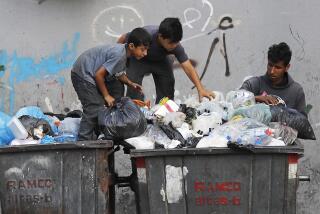Worries of Creditors Eased by President Hussein : War With Iran Forces Iraq to Streamline Economy
- Share via
BAGHDAD, Iraq — Iraq’s economy lost its footing in the 1986 oil price collapse but is regaining its balance, partly because of the 7 1/2-year-old war with Iran.
The conflict, which is costing $10 billion a year, has forced President Saddam Hussein to streamline a bloated prewar bureaucracy, to increase efficiency in government sectors and to scrap some of his socialist programs.
Oil prices are firmer and oil exports are climbing. Hussein has sold off inefficient state-owned enterprises in a program aimed at revitalizing the private sector, long suppressed by socialist policies.
This has helped ease the worries of Iraq’s many creditors, who last year had to reschedule the country’s debt repayments because the Iraqis did not have enough cash.
Even so, Iraq is only just managing to keep pace with a war-incurred foreign debt of at least $35 billion, diplomats said.
The government’s decision last year to loosen its grip on subsidized prices and foreign exchange has helped reduce once-chronic shortages, but at a painful cost for many of Iraq’s 15 million people.
The long lines of shoppers outside stores are shorter now than in 1986 because goods are more plentiful.
Some Iraqis grumble about prices, however.
Local meat, which used to cost the equivalent of $7.50 to $9 a pound, now sells for $9 to $10.50 a pound, at the dollar’s official rate of exchange against the dinar of $3.30 to one. Exchange houses outside Iraq, however, trade the dinar at 50 U.S. cents to one.
Bread, rice and cooking oil remain subsidized. But a package of 30 eggs that once cost $4.30 U.S., now sells for at least $8.30 U.S.
Even the cost of candy bars has risen, from 25 U.S. cents to nearly $1 U.S.
These are stiff prices for many workers. Civil servants, for example, earn 90-150 dinars a month.
Many Iraqis have found their incomes squeezed further this year by increased working hours in essential industries and offices, making the once-common practice of moonlighting nearly impossible.
It’s still difficult to find many goods at subsidized prices, forcing Iraqis into the costly black market for such things as car parts or cigarettes.
The variety on the vegetable stands is the most visible sign of Iraq’s move away from 20 years of strict socialist controls on the economy.
The government told businessmen last year they could import goods with foreign currency, with few questions asked about how they got the money.
Planning Minister Samal Majeed Faraj said recently Iraq will allow Arabs from other countries to invest in Iraq with guarantees against government seizure of their assets.
In the last year, the government has sold off bus companies, poultry farms, dairies, gas stations and supermarkets and other businesses and is trying to get outside investors to buy a stake in Iraqi Airways, the national flag carrier.
Saddam also abolished labor laws that had guaranteed employment.
Other countries are looking at Iraq with more confidence. It has won promises of new loans or credit guarantees from the United States, France and West Germany.
“Until the war, it didn’t matter if the economy was well run or not, because they had so much money,” a European diplomat said.
“This is a country with more than 100 billion barrels of proven oil reserves,” the diplomat noted. “They plainly have a way to repay.”
More to Read
Inside the business of entertainment
The Wide Shot brings you news, analysis and insights on everything from streaming wars to production — and what it all means for the future.
You may occasionally receive promotional content from the Los Angeles Times.









